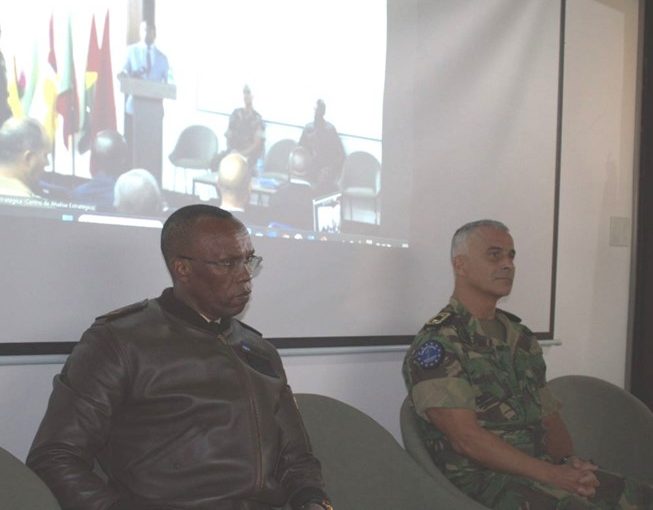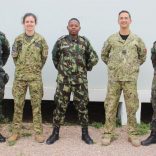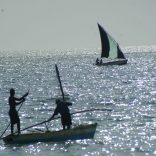Mozambique: Almost 300 people rescued from self-proclaimed 'Naparamas' - army
Mozambique: Special forces trained by EU performing “extremely positive” on the ground – Watch

Brito (right), who holds the rank of Marine Commodore, was speaking during a lecture on the "Contribution of the European Union Training Mission to Mozambique's Defence and Security", organised in Maputo by the Centre for Strategic Analysis of the Community of Portuguese Speaking Countries (CPLP). [Photo: Twitter / EUTM Mozambique]
The Mozambican special forces trained by the European Union (EU) to combat “terrorism” in Cabo Delgado are performing “extremely positively” on the ground, despite “some small failures”, the commander of the training mission has said.
“The information at the moment is extremely positive, it is differentiating, it is, in fact, remunerative for what is the general effort of the FADM [Mozambique armed defence forces] in Cabo Delgado,” said Portuguese Rogério Martins de Brito, commander of the European Union Training Mission in Mozambique (EUTM) on Wednesday.
Brito, who holds the rank of Marine Commodore, was speaking during a lecture on the “Contribution of the European Union Training Mission to Mozambique’s Defence and Security”, organised in Maputo by the Centre for Strategic Analysis of the Community of Portuguese Speaking Countries (CPLP).
#EUTMMOZ Mission Force Commander, Commodore Martins de Brito, conducted a briefing on #EUTM MOZ contribution to the Defence and Security of Mozambique 🇲🇿 at @caecplp.
Watch the full conference on YouTube here 👇https://t.co/OFoTvfATGI#EuropeanUnion #Mozambique #EstamosJuntos pic.twitter.com/FZ7qyKX6F3
— EUTM Mozambique (@EUTMMozambique) July 28, 2023
Trained to be Quick Reaction Forces (QRF) and adapted to the challenges posed by the insurgency in Cabo Delgado province, northern Mozambique, the members of those units are endowed with special characteristics such as high mobility, readiness, flexibility, interoperability and command and control capabilities, he said.
The official said that the assessment of the QRF’s performance in Cabo Delgado has been made with the EUTM by the command of the armed defence forces of Mozambique (FADM) and by the military missions of the Southern African Development Community (SADC) and Rwanda, which are also fighting the rebels in that province.
Admitting that the performance of the units in question has known “some small failures”, Brito warned that the “eradication of terrorism” will not be achieved only with the use of QRF, because this type of device is cut out for “surgical operations” and does not act as regular forces, which are prepared for the occupation of territory and routine patrolling.
The EUTM commander emphasised that the Mozambican special forces are involved in offensive actions against the rebels, in a framework of joint action with the Mozambican, SADC and Rwandan regular forces.
“Since I arrived [to lead the mission] ten months ago, I see clear improvements in coordination, command, communication, mobility and interoperability,” emphasised Rogério Martins Brito.
With a two-year mandate, starting in September 2022, EUTM will assess with the Mozambican authorities the future of its presence in Mozambique by the end of this year, but has already trained about 60 Mozambican instructors who will continue training the country’s special forces, he said.
In addition to providing operational training to the QRF, EUTM has also provided combat equipment to members of these units, with the value of material support already exceeding 80 million euros.
Rogério Martins de Brito advocated greater coordination and presence of civil society organisations, humanitarian support agencies and government entities in Cabo Delgado, to promote development initiatives, because the military response is not sufficient to eradicate violent extremism in the province.
“There is no security without development and there is no development without security,” Brito emphasised.
He noted that the training of Mozambican special forces under the EUTM incorporates values upheld by the EU, such as the defence of human rights, international humanitarian law, non-discrimination, protection of children, the elderly and women, as well as combating gender-based violence.
The EUTM mandate provides for the training of 11 Mozambican QRF units, each of which has a composition equivalent to a military company.
The mission is made up of a contingent of 117 people, 65 of whom are from Portugal, which also assumes command of EUTM during the two-year mandate.
Cabo Delgado province has been facing armed insurgency for almost six years with some attacks claimed by the extremist group Islamic State.
The armed insurgency has led to a military response since July 2021, with support from Rwanda and the Southern African Development Community (SADC), liberating districts near gas projects, but new attacks have emerged south of the region and in neighbouring Nampula province.
The conflict has already displaced one million people, according to the United Nations High Commissioner for Refugees (UNHCR), and claimed around 4,000 lives, according to the conflict registration project, ACLED.
Watch the fulll conference.













Leave a Reply
Be the First to Comment!
You must be logged in to post a comment.
You must be logged in to post a comment.